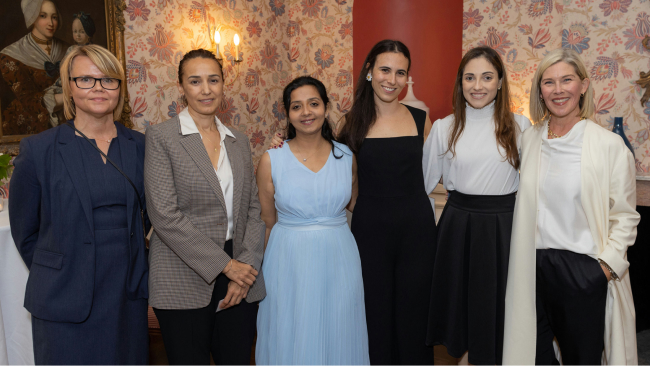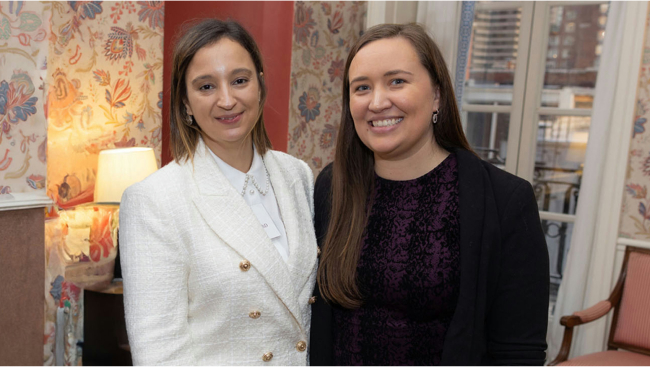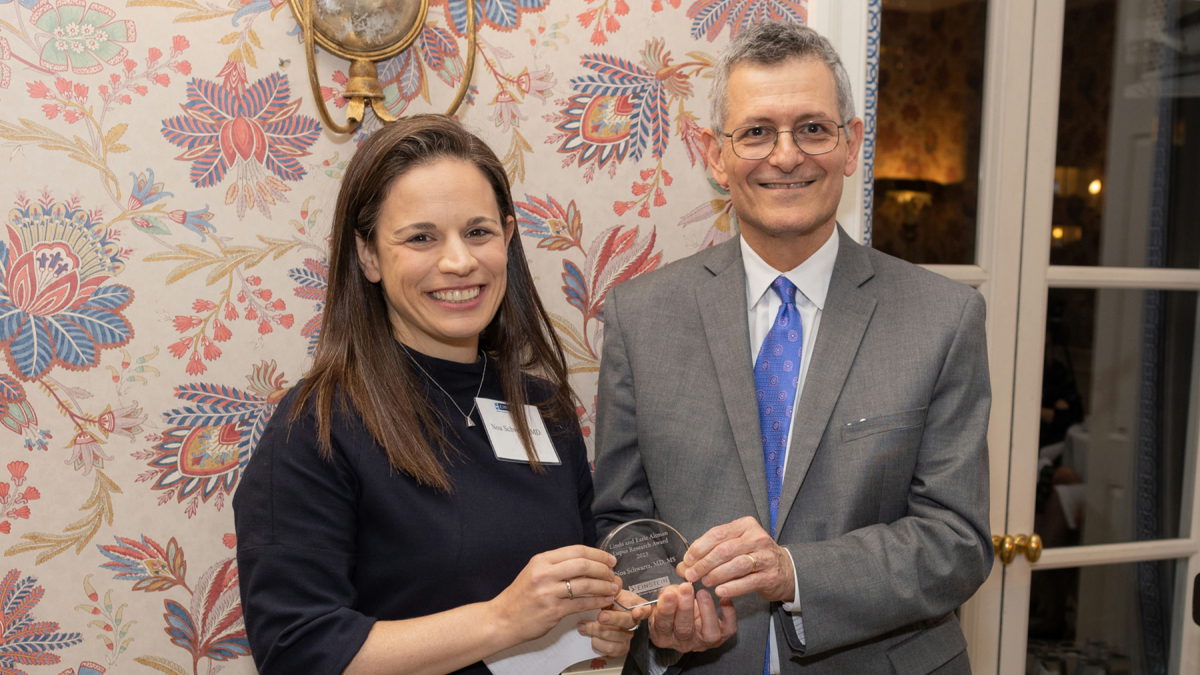While women now outnumber men in graduate and medical school, female researchers still lag behind their male counterparts in securing institutional support, funding from the National Institutes of Health and career advancement.
To help address this disparity, three members of Albert Einstein College of Medicine’s Board of Trustees have provided financial support to several female researchers at the College of Medicine. The awards, presented at a ceremony at the Cosmopolitan Club in midtown Manhattan, ranged from one-year, $15,000 grants to nearly $1 million over eight years. All the awards are intended to advance the scientists’ research with the goal of furthering their careers.
“I am proud that Einstein has such extraordinary trustees who are committed to funding innovative research and especially to advancing women in science,” said Yaron Tomer, MD, The Marilyn and Stanley M. Katz Dean, Albert Einstein College of Medicine, Chief Academic Officer, Montefiore Einstein. “Their generosity helps our exceptional investigators further their scientific careers and explore novel avenues of research that will help address pressing health issues, particularly those that affect our Bronx community.”
Ruth Gottesman, EdD, Chair, Albert Einstein College of Medicine Board of Trustees, and Professor Emerita, Pediatrics, Albert Einstein College of Medicine, welcomed the attendees to the event. “These scientists were selected for their innovative research and exciting discoveries, leading to potential cures for a wide range of diseases,” she said. “The importance of philanthropic support to advance research is vital to Einstein’s mission to translate scientific discoveries into life-changing patient outcomes.”
The awards are as follows:
Ceriale Postdoctoral Fellowship Award
Einstein trustee Melissa Ceriale and her husband John established this award through their foundation, the John and Melissa Ceriale Foundation Inc., to provide competitive funding to attract and retain promising postdoctoral researchers at Einstein. The funding, given in partnership with the National Cancer Institute-designated Montefiore Einstein Comprehensive Cancer Center’s Blood Cancer Institute, was awarded to:
Samarpana Chakraborty, PhD, a postdoctoral fellow in the laboratory of Aditi Shastri, MD. Dr. Chakraborty focuses on understanding the role of the protein STAT3 in acute myeloid leukemia (AML) and myelodysplastic syndromes (MDS), two related blood disorders that are overrepresented in the Bronx. She is working with novel drugs that target STAT3, which is associated with metastasis and worse cancer outcomes, for patients with drug-resistant AML and MDS.
Marta Mastrogiovanni, PhD, a postdoctoral fellow in the laboratory of Teresa Bowman, PhD. Dr. Mastrogiovanni uses zebrafish to explore how healthy and malignant blood development is regulated. She studies the regulatory mechanisms that shape how hematopoietic stem and progenitor cells (HSPCs) generate different blood cells and how shifts in HSPCs make one cell type over another contribute to blood diseases such as leukemia.
Lidiane Torres, PhD, is a postdoctoral fellow initially recruited by Paul Frenette, MD, and is now a member of the laboratory of Keisuke Ito, MD, PhD. Dr. Torres is studying how changes in the bacteria that normally live in the human gut can worsen inflammation in sickle cell anemia. By developing drugs that prevent gut bacteria from causing inflammation, she hopes to help alleviate the most severe symptoms experienced by sickle cell patients.

Ceriale Junior Investigator Award
The Ceriales also contributed support for early-career faculty to use at their discretion to advance their research. The awardees are as follows:
Esperanza Arias-Perez, PhD, Assistant Professor, Medicine (Hepatology), Pathology, Albert Einstein College of Medicine. She belongs to the Marion Bessin Liver Research Center, the Comprehensive Cancer Center’s Stem Cell & Cancer Biology (SCCB) Program, and the Einstein Institute for Aging Research. Dr. Arias-Perez leads a group that studies the role of autophagy, a cellular clean-up process by which proteins are broken down and recycled, in cancer development. She and her colleagues focus on the liver damage—and the consequent promotion of liver cancer—caused by the contribution of defective autophagy.
Helena M. Blumen, PhD, MS, Associate Professor, Medicine (Geriatrics), Saul R. Korey Department of Neurology, Albert Einstein College of Medicine. Dr. Blumen studies the brain networks we use to walk, reason, make decisions and form memories, with a particular focus on older adults. She is investigating whether training older people to improve their gait (manner of walking) can also improve their cognitive processes, and vice versa. She is also interested in how social interaction and support influence gait and cognition in aging.
The Rowland and Sylvia Schaefer Family Pilot and Feasibility Award for Women in Cancer Research

To advance women focusing on novel cancer research, Einstein trustee Marla Schaefer has established an award through her family’s foundation in partnership with Comprehensive Cancer Center’s Women’s Initiative Network, which was instrumental in developing the award and selecting the recipient. Below is the awardee:
Lindsay M. LaFave, PhD, Assistant Professor, Cell Biology, Albert Einstein College of Medicine. A member of the Stem Cell & Cancer Biology (SCCB) Program at the Comprehensive Cancer Center, Dr. LaFave studies lung adenocarcinoma, the most common type of lung cancer. Her lab is investigating the impact of environmental exposures on respiratory health and the development of lung adenocarcinoma. This grant will support her work exploring the effects of cigarette smoke on lung cells, which she found leads to an altered lung stem-cell state, and new therapeutic interventions to treat these cells.
Linda and Earle Altman Faculty Scholar in Lupus Research Award
Einstein trustee Linda Altman and her husband Earle provided funding for creating a faculty scholar position. This gift will allow Noa Schwartz, MD, MS, Director of the recently established Montefiore Einstein Institute for Lupus Care and Research, to recruit and provide start-up costs for a new Assistant or Associate Professor who conducts basic science research on lupus.





